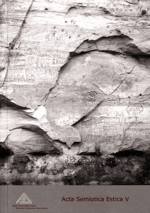Kehast ja ratsionaalsusest vokaalses keeleta väljenduses
On body and rationality in vocal expression outside language
Author(s): Viivian JõemetsSubject(s): Semiotics / Semiology
Published by: Eesti Semiootika Selts
Keywords: voice; body; orality; non-sense singing; hääl; keha; suulisus; tähenduseta laul
Summary/Abstract: The article deals with the question of the creation of meaning in voice without language from the aspect of the presence of the body, and thus orality, in a vocal act such as speech or song or any other voiced utterance. The ideal of rationality that predominates in the Western civilization characterized by fully interiorized literacy underlies the purely conceptual view of the world, influences man’s perception of his body. In his striving towards the visual and the written, which has proved to be a significant practical advantage, man has distanced himself from his body and voice on the individual as well as social level. Body, perceived as a whole, has become an attribute, not a part of man’s inseparable self. Body is cultural as it is through the society that man forms his understanding of his body, assesses its normality, beauty, functionality. Language in its visual form of phonetic writing is a very recent invention when compared to the history of mankind. Contemporary voice artists attempt to return in some way to the pre-literacy situation of the unity of expression and body, creating a form of non-sense singing employing holistic protolanguage that has been proposed by some evolutionary theorists as one possible scenario for the emergence of language. Such holistic protolanguage includes body in the signifying act as an integral part of man’s self.
Journal: Acta Semiotica Estica
- Issue Year: 2008
- Issue No: 5
- Page Range: 146-162
- Page Count: 17
- Language: Estonian

